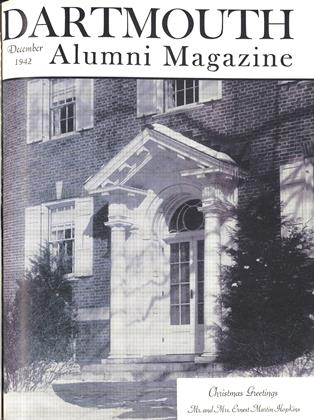The charge has been made and frequently repeated that the American people are "soft." Like so many other charges, this one has just enough of truth in it to make it superficially plausible. It can hardly be denied that the national muscle had become rather well protected by a thick layer of fatty social tissue, produced by a long period of easy living in which many luxuries had come to be, or seem to be, necessities. The great problem has thus become one of training down to a fit national condition, and on this task the American people have been forced to concentrate in deadly earnest.
It should not be assumed that merely because the muscles are so deeply imbedded in adipose tissue they are not there. Still less should it be assumed that the products of a period of easy living cannot be made to melt, thaw and resolve itself into a dew. Nobody really enjoys training down, and the process necessarily entails a lot of grumbling because no one relishes having his customary ease interfered with. Nevertheless it can be done when it must be, and the really important thing is the moral fibre. If that had atrophied, the American people would indeed be in a sorry case. But there are signs aplenty that there hasn't been so serious a disintegration of that fibre as we have been told by our gloom mongers there has been. In other words, while there's no doubt that we're soft, we're not so soft as all that. It isn't easy to discover blessings in anything so devastating as war, but with all its material ruin it is pretty sure to yield a compensation through the painful process of training down to a wholesome moral condition.
It should not be forgotten that we are fighting, among other things, for the return of conditions in which easy living may revive—and in all probability be overdone as it was before. The benefits of hard living will endure for a time, but only for a time. The benefits, however, will be there, evanescent though they be.
 View Full Issue
View Full Issue
More From This Issue
-
 Article
ArticleHanover's First Aid Maestro
December 1942 By JOHN HURD '21 -
 Article
ArticleDartmouth War Directory
December 1942 -
 Article
ArticleThe Five Maries
December 1942 By WILLIAM CARROLL HILL -
 Class Notes
Class Notes1918*
December 1942 By ERNEST H. EARLEY, DONALD L. BARR -
 Class Notes
Class Notes1935*
December 1942 By JOHN D. GILCHRIST JR., BOBB CHANEY -
 Sports
SportsBig Green Teams
December 1942 By Elmer Stevens JR. '43
P. S. M.
-
 Article
ArticleOne Way to Build Morale?
November 1943 By P. S. M. -
 Article
ArticleGovernment Issue
March 1945 By P. S. M. -
 Article
ArticleA Lively Relic
January 1946 By P. S. M. -
 Article
ArticleSi Monumentum Requiris
March 1946 By P. S. M. -
 Article
ArticleThe First Commandment
March 1946 By P. S. M. -
 Article
ArticleThe Fourth Estate
May 1946 By P. S. M.








